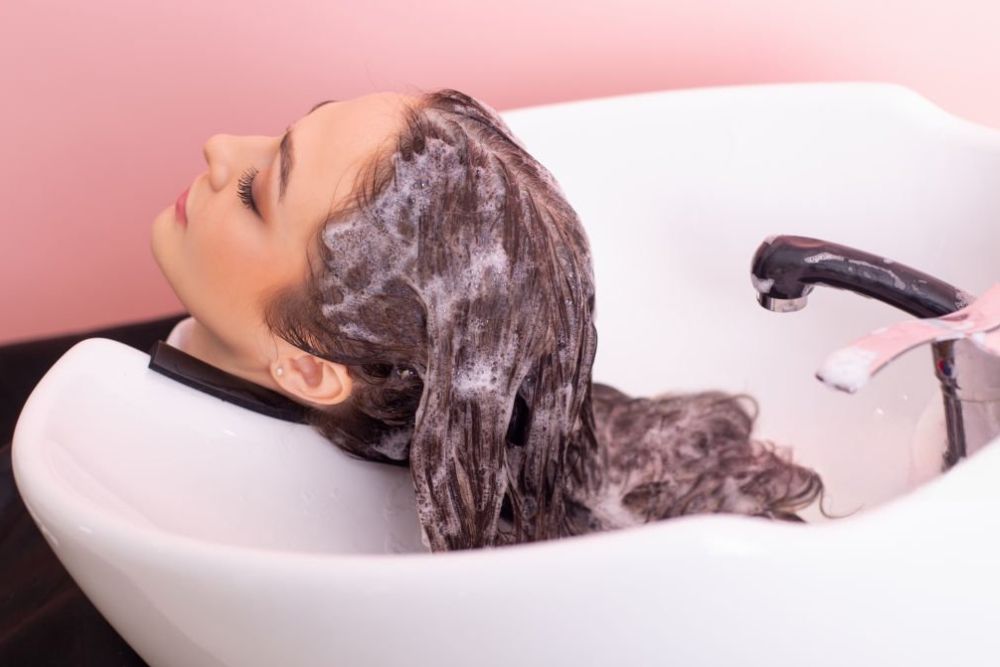Last updated on October 11th, 2025 at 02:31 pm
Understanding the Effects of Hard Water on Hair
Natural Remedies and Best Shampoos for Hard Water Hair Damage
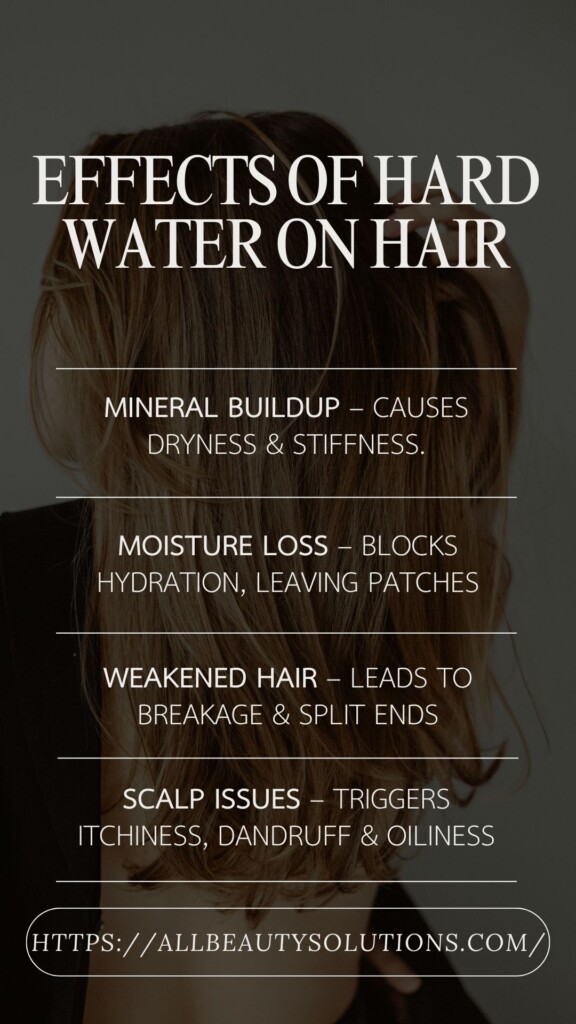
Before diving into solutions it’s important to recognize how hard water silently sabotages hair health:
- Mineral buildup: calcium and magnesium create a film on hair strands, leading dryness and stiffness.
- Moisture loss: deposits prevent the proper absorption of hydration, leaving hair patched.
- Weakened hair structure: over time, buildup makes strands more prone to breakage and split ends.
- Scalp issues: hard water can contribute to itchiness, dandruff, even excessive oil production as the scalp tries to compensate for dryness.
- Color fading: if hair is dyed, hard water can strip color faster, leading to premature fading.
Once these sign appear, it’s crucial to take action before irreversible damage sets in.
Natural Remedies to Reverse Hard Water Damage
Hard water damage doesn’t have to be permanent. With the right natural treatments, hair can regain its softness, strength, and shine.
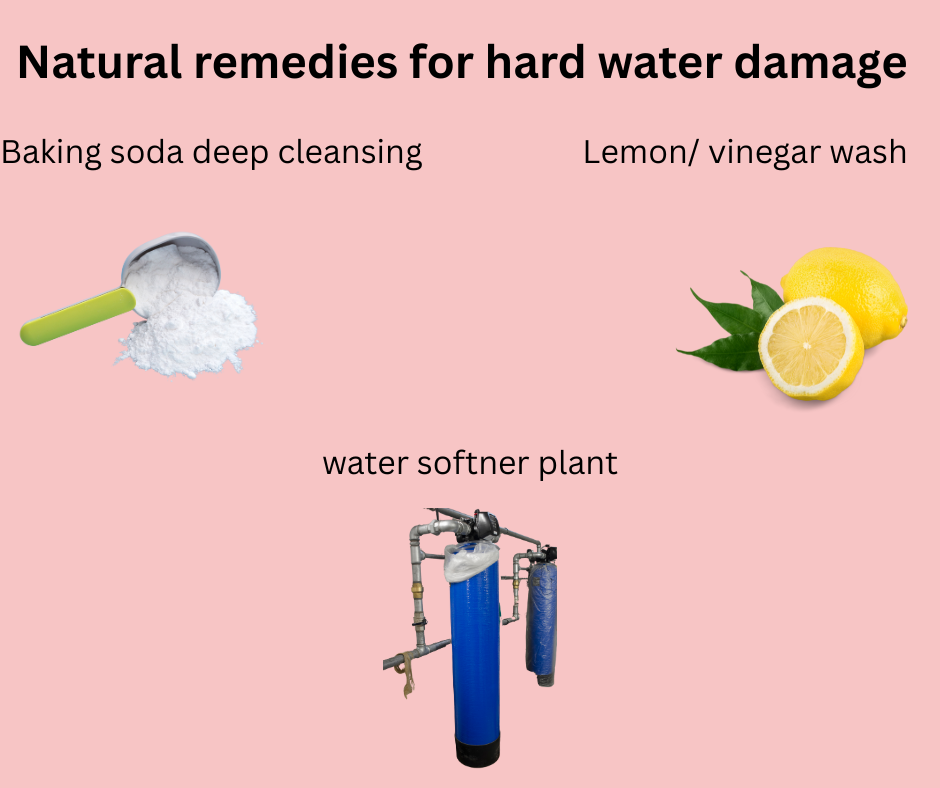
1. Apple Cider Vinegar Rinse-A Natural Clarifier:
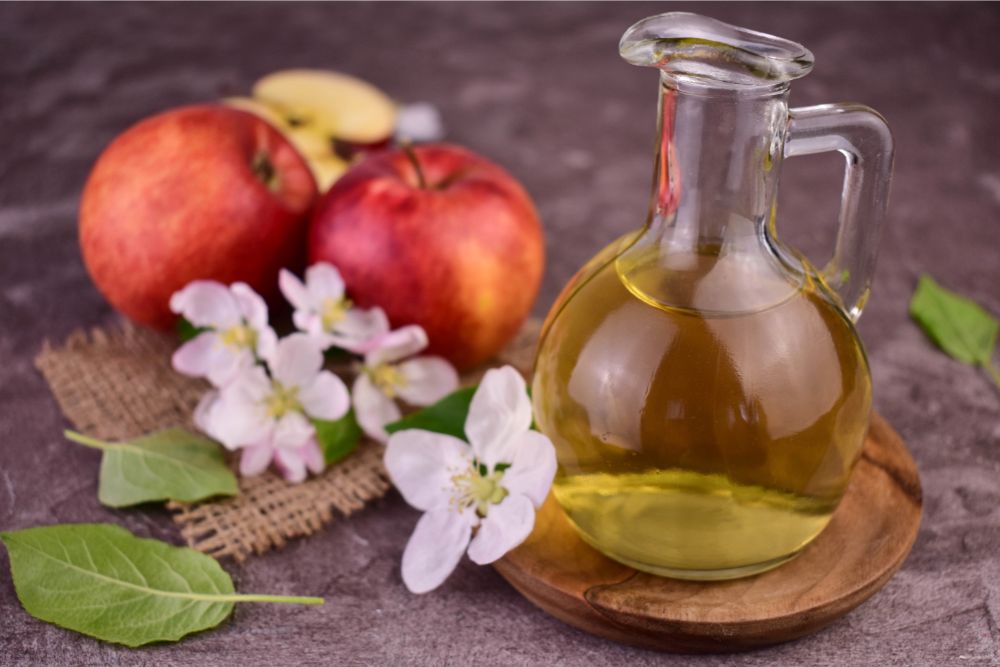
Apple cider vinegar (ACV) has long been praised for its ability to dissolve mineral buildup, restore pH balance, and shine. A simple rinse with diluted ACV after shampooing helps break down stubborn residues, leaving hair feeling refreshed.
How to use:
- Mix 1-2 tablespoons of ACV with a cup of water.
- Pour over hair after shampooing, let it sit for 2-3 minutes, then rinse with cool water.
- Use once or twice a week to prevent buildup.
Pro Tip: for those sensitive to strong scents, adding few drops of lavender or rosemary essential oil rose can make the rinse more pleasant.
2. Lemon Rinse – Brightening and Mineral Removal
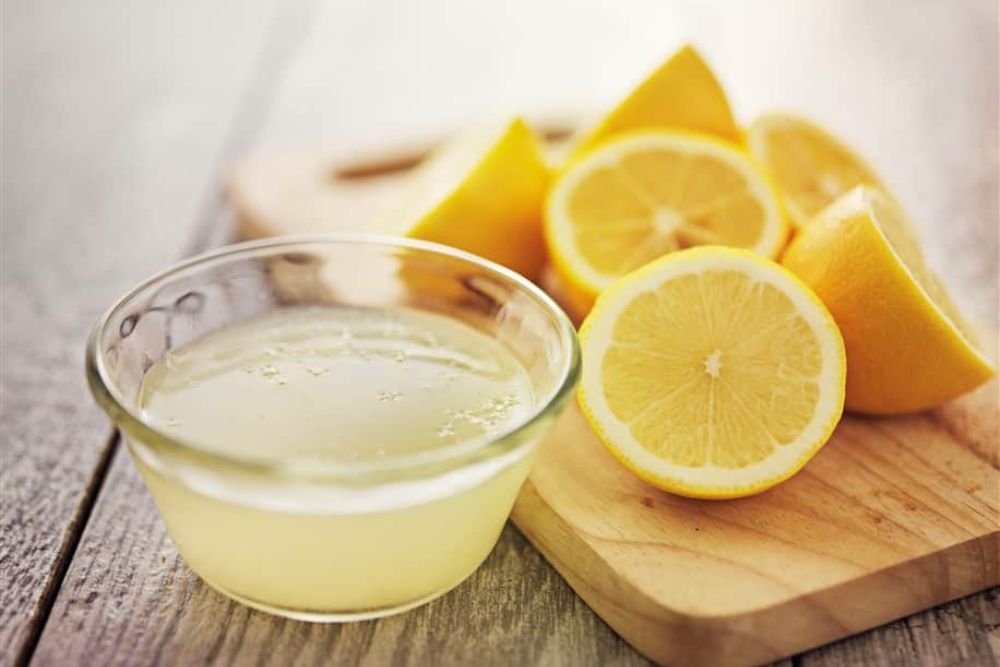
Lemon juice work similarly to ACV, breaking down mineral deposits while enhancing shine. It’s particularly effective for those with oily hair type that tend to look limp due to hard water.
How to use:
- Squeeze the juice of half a lemon into a cup of water.
- Pour over damp hair, massage in for a minute or two, and then rinse.
- Use once a week to avoid over-drying.
3. Baking Soda Detox Deep Cleansing for Buildup
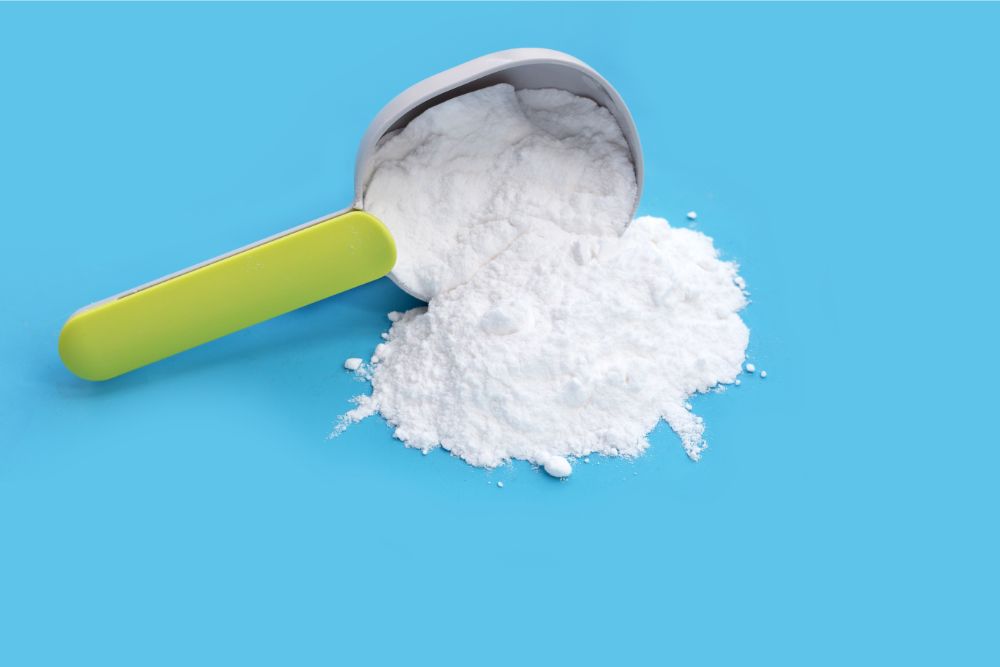
For hair that feels heavy, greasy or coated, a baking soda rinse can help strip away mineral residue. However, this should be used with caution as it can be drying.
How to use:
- Mix 1 tablespoon of baking soda with a cup of warm water.
- Apply to wet hair, focusing on the scalp and lengths.
- Rinse thoroughly and follow with a hydrating conditioner.
- Use only once a month to prevent excessive dryness.
4. Coconut Oil Treatment Repair and Hydration
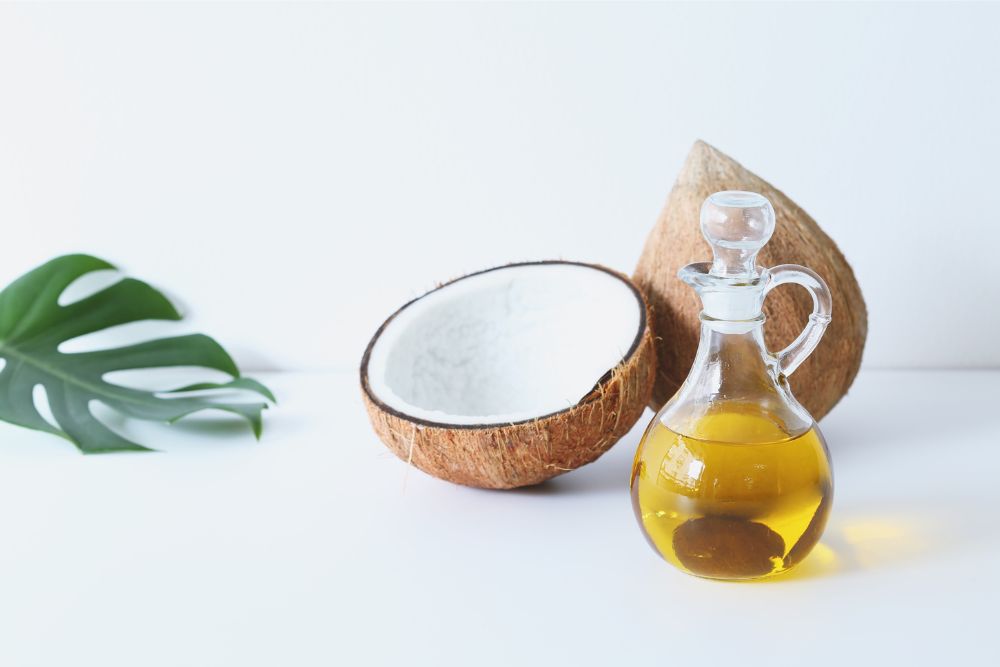
After removing buildup, hydration is key. Coconut oil penetrates deep into the hair shaft, restoring moisture and preventing protein loss.
How to use:
- Warm a small amount of pure coconut oil and apply from mid-length to ends.
- Leave it on for 30 minutes to overnight, then wash as usual.
- Best used once or twice a week for optimal results.
For a lightweight alternative, argon oil or jojoba oil also work well to seal in moisture.
5. Install water softener
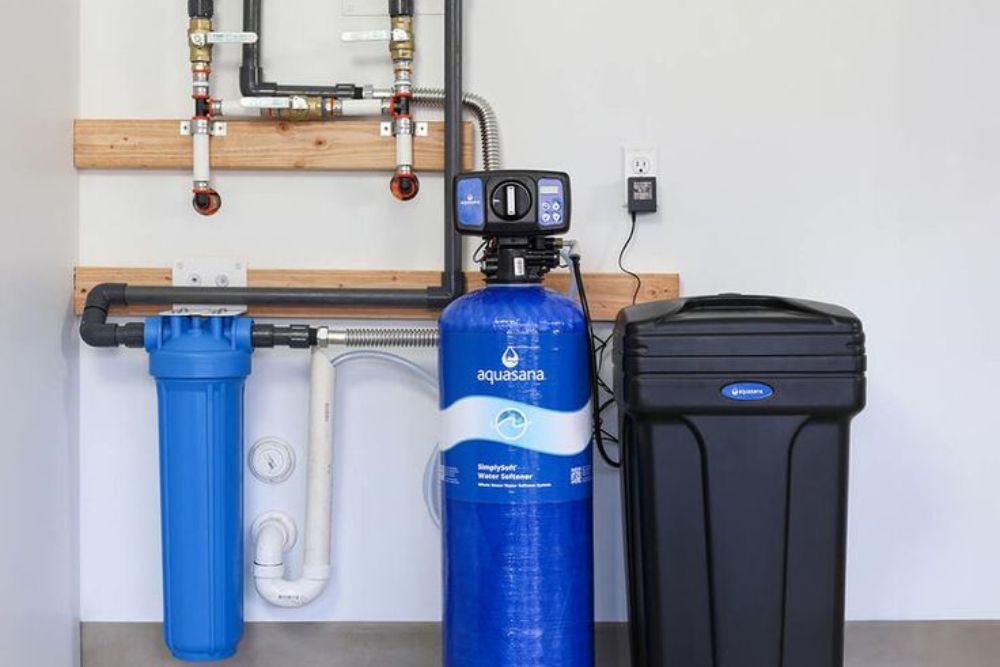
One of the best long-term solution is installing water softener. A water softener removes minerals responsible for hard water, preventing them from settling on hair and scalp. This results in shinier, softer, and more manageable hair.
Alternative: if a full water softener isn’t an option, install a shower filter that removes some minerals and chlorine.
Recommendation
- Water boss whole house salt-free descaler system
The Water boss whole house salt-free descaler system offers an eco-friendly solution to combat scale buildup in your home plumbing. Utilizing a salt-free and chemical-free method. This system effectively reduces scale without the need for electricity or regular maintenance.
- Rotek whole house water filtration system with polyphosphate
https://www.amazon.com/Rotek-Water-Filtration-System- Polyphosphate/dp/B0D1ZB277X/ref=sr_1_2
The Rotek whole hose water filtration system is designed to provide clean water throughout your home. This two stage filter system utilize polyphosphate crystals to prevent scale formation and effectively remove impurities from water.
Best Shampoos for Hard Water Hair Damage
For those exposed to hard water daily, a chelating or clarifying shampoo is essential. These shampoos are specifically formulated to remove mineral buildup and restore softness.
1. Malibu C Hard Water Wellness Shampoo
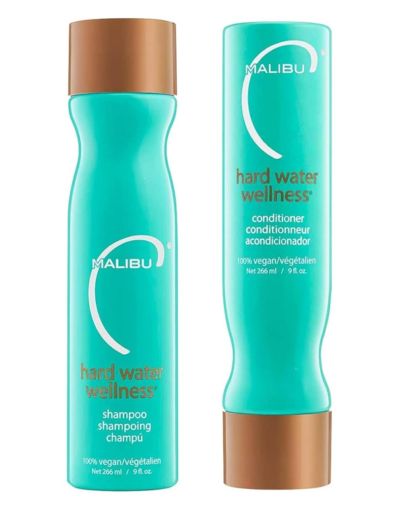
This 100% vegan shampoo is formulated to remove and protect against minerals found in hard water that can cause dryness, damage, and discoloration. It gently cleanses without harsh chemicals or sulfates, leaving hair hydrated and vibrant.
PROS:
- Effectively removes mineral buildup from hard water.
- Free from sulfates and harsh chemicals
- Hydrates and restore natural shine
- Pleasant orange Dreamlike scent.
Cons:
- May not lather as much due to the absence of sulfate.
2. INFINA ESSENTIALS chelating hard water shampoo
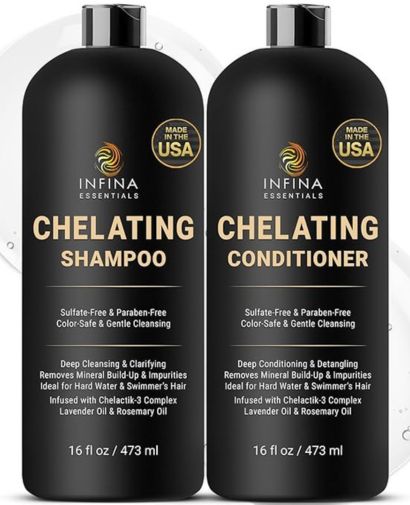
This shampoo is specially formulated to detoxify hair by removing mineral buildup and impurities. Enriched with lavender and rosemary oils, along with vitamin E, it nourishes hair while providing gentle yet effective cleansing without sulfate. It’s suitable for daily use and helps preserve the vibrancy of color-treated hair.
PROS:
- Removal hard water minerals and chlorine residue.
- Contains natural oils and vitamin E for nourishment.
- Sulfate-free formula is gentle on hair.
- Enhances and preserve color-treated hair.
CONS:
- Scent may not appeal to everyone.
3. L’Oreal Professional Series Expert Pure Resource Shampoo
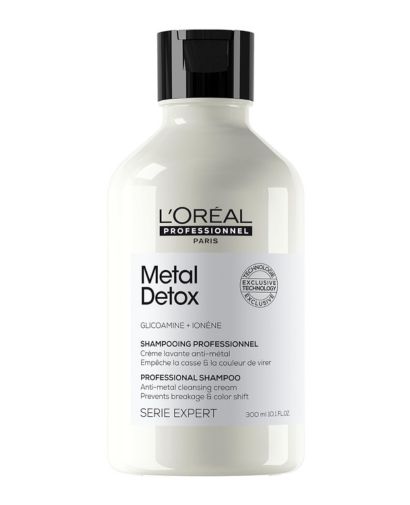
Designed for normal to oily hair, this purifying shampoo utilizes Citra mine technology and vitamin E to remove product buildup and hard water residues. Its aqua crystal formula deeply cleanses the scalp leaving hair feeling nourished, protected, and shiny.
PROS:
- Effectively removes styling product buildup and excess oil.
- Rinse away hard water residue.
- Leaves scalp feeling clean and refreshed.
- Restore shine and protects hair.
CONS:
- May be too clarifying for very dry hair types.
When choosing a shampoo to combat hard water damage, consider your hair type and specific needs to select the most suitable product.
DISCLAIMER: The information provided above is for general informational purpose only and is not intended as a substitute for professional advice. Individual results may vary depending on hair type, water quality, and personal hair care routines.
Preventing Hard Water Damage – Simple Daily Habits
Even the best shampoos and remedies won’t work unless preventive measures are taken:
- Use a shower filter: a high-quality showerhead filter reduce mineral content, preventing damage from the star.
- Final rinse with distillated water: a quick rinse with bottled or distillated water helps remove excess minerals after washing.
- Apply leave-in conditioner: a protective leave-in treatment shields hair from further buildup and lock in moisture.
- Deep conditioner weekly: hydration is key to combatting the dryness caused by hard water exposure.
FAQS:
How does hard water damage hair?
Hard water leaves mineral buildup that makes hair dull, dry, and prone to breakage. It can also cause scalp irritation and faded color over time.
What are the best natural remedies for hard water hair damage?
Rinsing with apple cider vinegar or lemon water helps remove buildup. Aloe vera, coconut oil, or yogurt masks restore softness and shine.
Which shampoos work best to reverse hard water damage?
Use clarifying or chelating shampoos containing EDTA, citric acid, or apple cider vinegar once a week to remove mineral deposits.
How can I prevent hard water from affecting my hair in the first place?
Install a shower filter, use distilled water for the final rinse, and apply leave-in conditioner or serum as a barrier against minerals.
How often should I use a clarifying shampoo for hard water buildup?
About once a week is ideal—too often can strip natural oils, so follow with a deep conditioner or moisturizing mask.
Final thoughts:
Which method will be tried first? Whether it’s an ACV rinse, a new shampoo, or a nourishing oil treatment, hair will soon thank you for the care it deserves.


